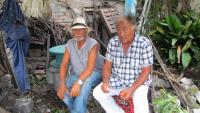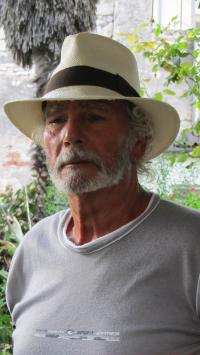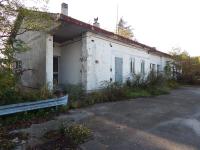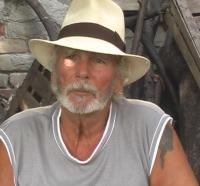„Your escapes, how many timed have you tried?“
„Two times.“
„Can you tell us about the first and seconf escape'“
„First time I was very young. Actually it was three times. First time I was caught at Monte Grando.“
„At Monte Grando?“
„Yes. There was a group of us wanting to escape to Italy, and we arrived at Monte Grando, later two of them went to buy bread and ham, we were supposed to go forward later..When we have arrived at Monte Grando, agents of UDBA were waiting for us.“
„Where at Monte Grando?“
„At the gas station.“
„There were a gas station in those times?“
„No, no it was all deserted. Only a porterhouse little to the left.“
„What was it's name?“
„I can't remember. I know that porterhouse exists today, but modernized.“
„A yes it's Turković, actually „At Sonja's“ porterhouse.“
„That's right.“
„Yes, yes.“
„There UDBA was waiting for us, they were taken into car, a I was taken into the forrest by this cop, this UDBA agent. He put a gun on my back pushing me deep into the forrest, I saw my mom and dad..no dad, but whole my family flashed through my eyes. I thought he is going to kill me, that it's all over. He pushed me with his gun. He said: „Where did you tried to go?“ I was scared...I said across the border. „Mother of yours, go home!“ I was so happy that he didn't killed me.“
„When did that happened?“
„That was...how old was I?! I was probably 11 years old, something like that.“
„So in 1951.“
„That's right.“
„And if you came in 1952 from Rovinj to Pula?“
„In 1952, I arrived from Rovinj to Pula so that was later in 1952 or 1952.“
„So in 1953...you were a complete crew?“
„There were several of us, at least four or five of us...young, all kids. That was the first time. The second tme I was with a Montenegrin, we aboarded a train and arrive in Divača, and in Divača we were discovered so we escaped into the woods I came near Škufija, a village, where we were captured.“
„Škofije? You've said Sežana a little earlier.“
„Škofije, Škofije.“
„Škofije. Why did you hid in a train?“
„Yes, we hid in a cargo wagon, there was one of that kind.“
„Aha.“
„So we entered.“
„How have you met this Montenegrin?Has he lived here?“
„He lived near the citadel, his family arrived from Monenegro, there were a lot of children, a she was accompanied by an Italian who was, I think, a prisoner of war during Italian administration. They've all escaped, the whole family. The were succesfull. I have never seen them anymore.“
„And the third time?“
„The third time I was succesfull.“
„Can you tell us about that?“
„My friend and I...he didn't want to go in the army. He asked me how about we try to escape..I wasn't feeling here...I returned from the army so I wasn't able to find a job, a lot of paperwork, a lot of a** kissing, I was very bored with that so I said: „I am going across the border.“ He said. „Let's go.“
„I'm sorry, but when have you returned from the military?What year?“
„In 1963.“
„1963, so you were 23 years old.“
„Yes.“
„Were you stationed at Kornati?“
„No, no. I was in Banja Luka.“
„In Banja Luka...“
„Yes...“
„That's where the tank drivers were?“
„I was in artillery.“
„Artillery..you have returned and decided to run away?“
„Yes...“
„Can you tell us what season was it, how did you planned it...?
„It was this time of the season. It was this season when I met his friend and got the call for the military. I was supposed to go to the military...I said that we have to go across the border. I was going by bus from here to Kopar.“
„What kind of bus?“
„A regular bus.“
„Name of the firm'“
„I can't remember.“
„You were going from the old bus station?“
„Yes, from the old bus station.“
„We arrived in Kopar, came down and continued on foot. We were going, I could orientate myself easily beacuse I was in the military Inknw how to do that, and we were going at night, so we were watching the sunset. We arrived in Škofije, again, there on the cemetery we waited for the whole day and night.“
„Athe cemetery in Škofije?“
„Yes.“
„Maybe you were suspects?“
„Nobody saw us. There was nobody at the cemetery. When someone would come we would hide, we would wait on a hill. Whole of Škofije were under the hill. We waited for night to come and as it come so did the big rainy clouds right from Italy. I said to my friend that it's best to go when the clouds come near the coast. So we made our move, it was raining hard, we couldn't see anything. We arrived right in the middle of tana. I took a look and could see houses and a soldier running. I said: „My God where have we arrived!?“ We were lucky, I could see it when we crossed the border. It was clear, a big place, it was clear, no trees no bushes. That's we managed to escape.
„You escaped to Trieste.“
„Trieste, yes.“




